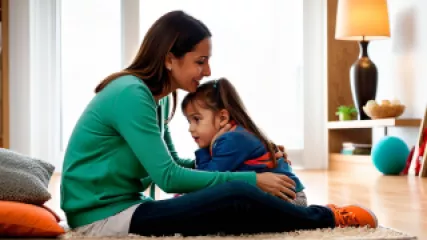Effective Strategies for Handling Conflicts in Parent-Child Relationships
Effective Strategies for Handling Conflicts in Parent-Child Relationships
Introduction
Parenting is a rewarding yet challenging journey that requires constant adaptation and learning. As children grow and develop, conflicts are bound to arise in the parent-child relationship. These conflicts can stem from differences in opinions, expectations, or simply a clash of personalities. However, it is essential to approach these conflicts with empathy, understanding, and effective strategies to maintain a healthy and nurturing parent-child bond.
In this research summary, we will explore various evidence-based strategies that parents can employ to handle conflicts in their relationships with their children. By implementing these strategies, parents can foster open communication, mutual respect, and emotional well-being within the family dynamic.
1. Setting Boundaries
Clear and appropriate boundaries are crucial in any relationship, including the parent-child relationship. Setting boundaries helps establish guidelines and expectations for behavior, promoting harmony and reducing conflicts.
Parents can set boundaries by:
- Clearly communicating rules and expectations
- Consistently enforcing consequences for crossing boundaries
- Encouraging open dialogue about boundaries and renegotiating them as needed
By setting boundaries, parents provide structure and guidance while also allowing their children to develop a sense of autonomy and responsibility.
2. Active Listening
Active listening is a powerful tool for resolving conflicts and strengthening the parent-child relationship. It involves giving your child your full attention, showing empathy, and seeking to understand their perspective without judgment.
To practice active listening:
- Show genuine interest in what your child has to say
- Maintain eye contact and use non-verbal cues to show attentiveness
- Reflect and paraphrase what your child is saying to ensure understanding
- Avoid interrupting or jumping to conclusions
Through active listening, parents can create a safe space for their children to express their thoughts and emotions, leading to better conflict resolution and stronger emotional connection.
3. Empathy and Understanding
Empathy is the ability to understand and share the feelings of another person. Cultivating empathy within the parent-child relationship promotes compassion, validation, and emotional support, which are vital during conflicts.
To demonstrate empathy:
- Validate your child's emotions by acknowledging their feelings
- Put yourself in your child's shoes and try to understand their perspective
- Show compassion and offer comfort when your child is upset
- Avoid dismissive or judgmental responses
By practicing empathy, parents can create an environment where conflicts can be addressed with understanding and compassion, strengthening the parent-child bond.
4. Mindfulness Exercises
Mindfulness exercises can be beneficial for both parents and children when dealing with conflicts. Mindfulness involves being fully present in the moment, non-judgmentally observing thoughts and emotions, and responding intentionally rather than reactively.
Some mindfulness exercises that can help during conflicts include:
- Deep breathing exercises to calm the mind and body
- Body scans to release tension and promote relaxation
- Practicing gratitude to shift focus towards positive aspects
- Engaging in mindful listening and speaking to improve communication
By incorporating mindfulness into the parent-child relationship, both parties can develop emotional regulation skills and approach conflicts with greater clarity and understanding.
5. Seeking Professional Support
In some cases, conflicts within the parent-child relationship may require additional support from a professional. Parenting coaches or therapists can provide guidance, tools, and strategies tailored to specific family dynamics.
Professional support can aid in:
- Identifying underlying issues contributing to conflicts
- Teaching effective communication techniques
- Providing a neutral and safe space for all family members to express themselves
- Guiding parents in implementing positive discipline strategies
Coaching services can empower parents with the necessary skills to handle conflicts and promote healthy relationships within the family.
Summary
Navigating conflicts in parent-child relationships requires patience, empathy, and effective strategies. By setting boundaries, practicing active listening, cultivating empathy, incorporating mindfulness exercises, and seeking professional support when needed, parents can create an environment that fosters understanding, growth, and connection with their children. Remember, conflicts are opportunities for growth and learning, and handling them effectively can strengthen the parent-child bond and contribute to the overall well-being of the family.






